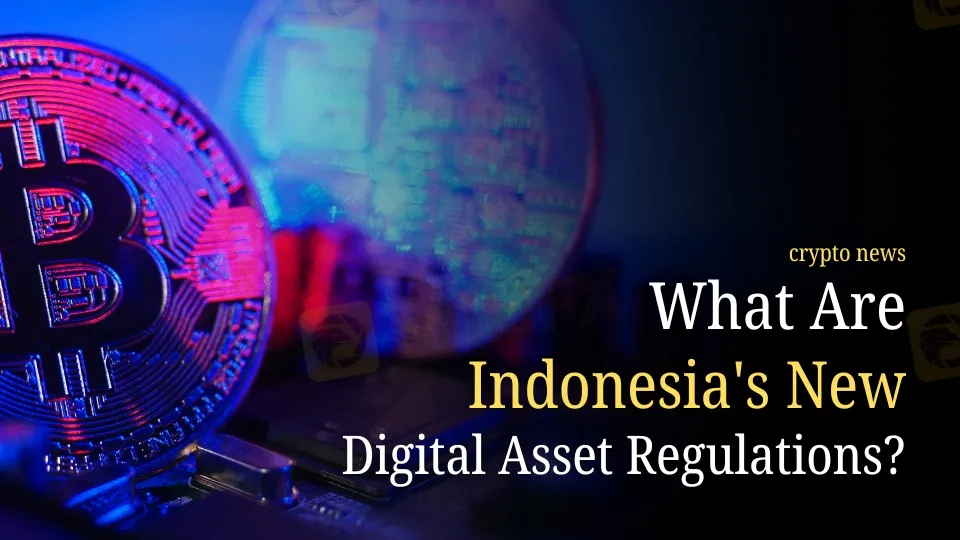What Are Indonesia's New Digital Asset Regulations?
Abstract:Indonesia’s crypto rules are changing as OJK leads regulation, VAT impacts trading, and the country rises as a key global hub for digital assets.

The Financial Services Authority (OJK) is taking over regulatory oversight from the Trade Ministry, causing substantial changes in Indonesia's digital asset ecosystem. With new legislation due to go into force, the country is prepared to overhaul its crypto ecosystem and cement its place as a worldwide leader in digital assets. Here's all you need to know about the changing regulations and their possible consequences.
OJK Takes Over Indonesia's Crypto Regulation
Indonesia revised its Financial industry Law in 2024, moving authority for the digital asset industry from the Commodity Futures Trading Agency (Bappebti) to the Financial Services Authority (OJK). The transition, which begins on January 12, intends to bring Indonesia's cryptocurrency rules in line with global norms.
OJK head Mahendra Siregar underlined the need for a smooth turnover, saying, “We've been working closely with the Trade Ministry to ensure a smooth process.” Once adopted, the rule will serve as the legal foundation for the transition.
The OJK has created a three-phase transition plan that will take place over the next two years. These include revising current legislation, developing new recommendations, and offering assistance to Virtual Asset Service Providers (VASPs). Stakeholders generally support this decision, citing OJK's knowledge as a crucial asset.

VAT on Crypto Transactions Sparks Debate
As Indonesia's legal environment transforms, a new 11% Value-Added Tax (VAT) on digital asset transactions, which went into force on January 1, has caused criticism. Industry executives argue that this levy would stifle the sector's expansion.
Oscar Darmawan, CEO of Indodax, Indonesia's largest exchange, emphasized the possible negative consequences of the VAT. “Balanced policies will promote a more favorable ecology. Crypto assets are not subject to VAT in many jurisdictions since they are deemed part of a financial transaction,” he said.
Despite their reservations, VASPs like Indodax are determined to comply with the new VAT while campaigning for its modification.
Indonesia's Rising Position as a Global Crypto Leader
Indonesia has become one of the world's major digital asset marketplaces. Indonesians spent Rp556.53 trillion ($34.5 billion) in the first 11 months of 2024, a 350% increase over the previous year. In addition, the country has risen in the Chainalysis Global Adoption Index, ranking third internationally in 2024.
Experts credit this increase to a mix of increasing adoption rates, new platforms, and supporting regulatory frameworks. Despite ongoing hurdles, Indonesia's digital asset industry shows no signs of faltering.
Final Thought
Indonesia's new digital asset legislation represents a watershed point in the country's crypto industry. As the OJK takes leadership and strives to apply worldwide best practices, the industry will gain stability and confidence. While problems such as the VAT tax exist, Indonesia's stratospheric ascent as a digital asset center highlights its potential to dominate the global crypto economy.

Read more

B2BROKER Launches PrimeXM XCore Support for Brokers
B2BROKER launches PrimeXM XCore support and maintenance services, enhancing trading efficiency for brokers with expert management and optimization.

EU MiCA Update: 10 Authorized Stablecoin Issuers & 11 CASP Providers
Under MiCA, 10 firms have been authorized to issue e-money tokens (EMTs), commonly known as fiat-backed stablecoins. These issuers have launched a total of 15 EMTs, consisting of 10 euro-denominated tokens and 5 US dollar-denominated tokens.

Google Bitcoin Integration: A Game-Changer or Risky Move?
Google Bitcoin integration blends wallets with Google accounts, stirring security fears and adoption hopes. ZKP encryption aims for privacy.

XTB Secures Chilean License, Expands Latin America Footprint
XTB gains a securities agent license in Chile, boosting its Latin America presence. The broker plans to offer stocks, ETFs, and derivatives to local investors.
WikiFX Broker
Latest News
Pi Network Mainnet Launch: Game-Changer or Crypto Controversy?
GlobTFX Users Report Same Issue! But Why?
Rate Cut or Not? It Depends on Trump’s Policies
Why Do You Keep Blowing Accounts or Making Losses?
eToro Adds ADX Stocks to Platform for Global Investors
B2BROKER Launches PrimeXM XCore Support for Brokers
Germany's Election: Immigration, Economy & Political Tensions Take Centre Stage
WikiFX Review: Is IVY Markets Reliable?
WikiFX Community Creator Growth Camp
Effect of Tariffs on Gold and Oil Prices
Rate Calc

